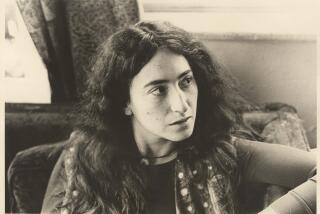Feminist Author Simone de Beauvoir Dies
- Share via
PARIS — Simone de Beauvoir, one of France’s leading literary figures and lifelong companion of the late existentialist philosopher Jean-Paul Sartre, died today at a Paris hospital. She was 78.
She wrote the international best seller “The Second Sex,” published in 1949 and regarded as a foundation stone of the women’s liberation movement worldwide. She was an ardent champion of women’s rights and a fundamental philosopher of the movement.
Constantly at Sartre’s side during his leftist crusades, De Beauvoir never lost sight of her commitment to women’s liberation. It was the main theme of her prolific and mostly autobiographical writing, and it shaped her life from early childhood to her death.
Sartre died in 1980. They never married, and each had numerous other love affairs. The two maintained separate but nearby apartments during their 50 years together.
In “The Second Sex,” De Beauvoir described marriage as an “obscene bourgeois institution” because it reduced to a litany of rights and duties what she felt should be a partnership of equals based on mutual and spontaneous attraction.
De Beauvoir’s critics accused her of being remote, cerebral and humorless in her treatment of women’s issues.
De Beauvoir and Sartre despised most social conventions, shunned fashionable literary gatherings and other social activities of the Paris elite. They entertained only close personal friends.
De Beauvoir was beside Sartre many times when police arrested them for participating in leftist demonstrations. Together, they edited extreme-left publications that were repeatedly banned by French authorities.
The older of two daughters, she was born in Paris on Jan. 9, 1908. Her father, a lawyer, was an atheist. Her mother was a Roman Catholic who insisted that Simone and her sister, Helene, receive a convent education.
In 1954 De Beauvoir won the Goncourt Prize for “The Mandarins,” a fictionalized account of the postwar climate in which Sartre and other leading intellectuals became disenchanted with communism.
“Memoirs of a Dutiful Daughter,” the first of four volumes of memoirs, was read by millions and hailed as an autobiographical classic.
“Coming of Age” (1970), her 21st book, was a bold indictment of Western civilization’s neglect of the elderly.
More to Read
Sign up for our Book Club newsletter
Get the latest news, events and more from the Los Angeles Times Book Club, and help us get L.A. reading and talking.
You may occasionally receive promotional content from the Los Angeles Times.









